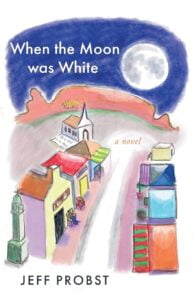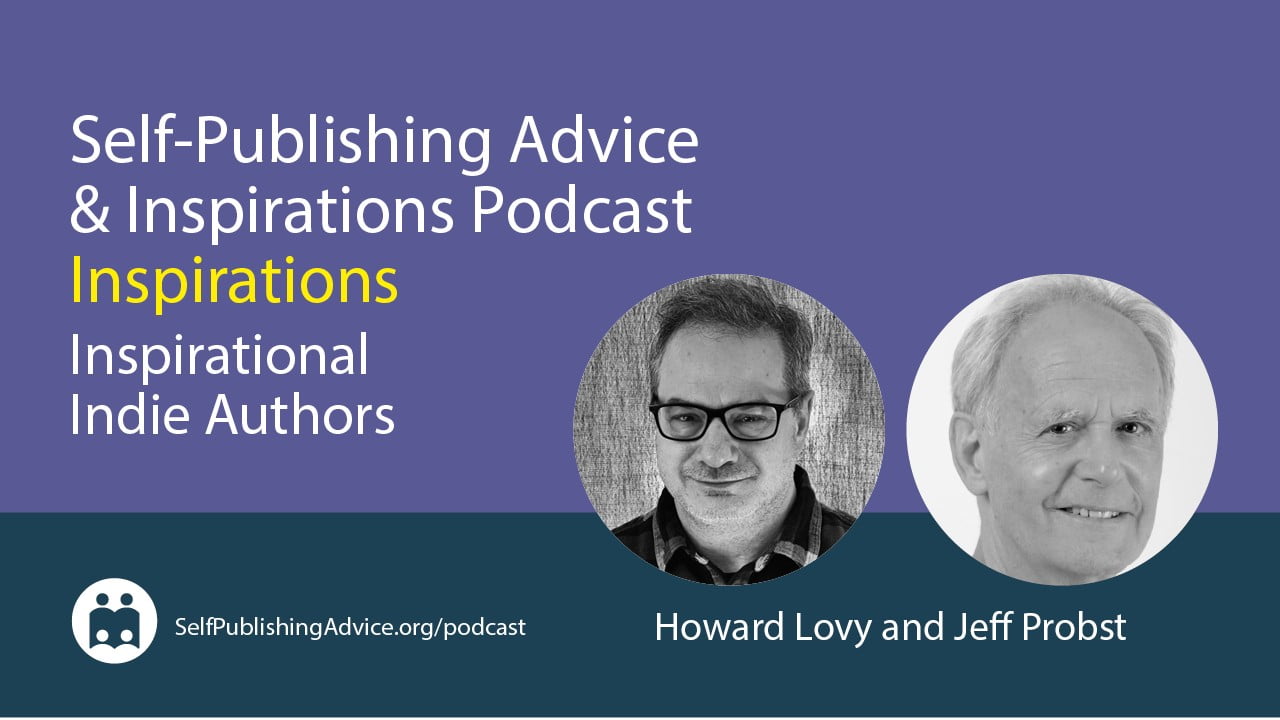My ALLi author guest this episode is Jeff Probst, who brings a unique international accent to his writing. From California to South Africa to the UK—and whether he is writing about apartheid, being a schoolteacher, or even about the moon—Jeff has developed a unique voice that cannot be categorized.
Find more author advice, tips, and tools at our Self-publishing Author Advice Center, with a huge archive of 2,000+ blog posts, and a handy search box to find key info on the topic you need.
We invite you to join our organization and become a self-publishing ally.
Listen to the Inspirational Indie Author Interview: Jeff Probst
On the Inspirational Indie Authors Podcast, @howard_lovy features Jeff Probst, who brings an international accent to his writing. His work is not easily categorized. Share on XDon't Miss an #AskALLi Broadcast
Subscribe to our Ask ALLi podcast on iTunes, Stitcher, Player.FM, Overcast, Pocket Casts, Spotify or via our RSS feed:
Inspirational Indie Author Interview: Jeff Probst. About the Author
 When the Moon was White (2022) is Jeff Probst’s first novel since Bachelor Butterflies (1994). He has had stories, articles and poems published in literary magazines, journals and newspapers in London, California and South Africa. Jeff is American and has lived in London since 1990 with his South African wife. You can find Jeff on his website.
When the Moon was White (2022) is Jeff Probst’s first novel since Bachelor Butterflies (1994). He has had stories, articles and poems published in literary magazines, journals and newspapers in London, California and South Africa. Jeff is American and has lived in London since 1990 with his South African wife. You can find Jeff on his website.
About the Host
Howard Lovy has been a journalist for more than 35 years, and now amplifies the voices of independent author-publishers and works with authors as a developmental editor. Find Howard at howardlovy.com, LinkedIn and X.
If you’re a published indie author who would like to be interviewed by Howard for the Inspirational Indie Authors podcast, you need to be a member of the Alliance of Independent Authors.
Then contact Howard, including your membership number, explaining why you’re an inspirational indie author and what inspires you.
If you haven’t already, we invite you to join our organization.
Read the Transcripts to the Inspirational Indie Author Interview: Jeff Probst
Howard Lovy: My guest this episode is Jeff Probst who brings a unique international accent to his writing. From California to South Africa to the UK, and whether he is writing about apartheid, being a schoolteacher, or even about the moon, Jeff has developed a unique voice that cannot be categorized. I'll let Jeff Probst tell his story.
Jeff Probst: My name is Jeff Probst.
I'm an American, as you might be able to hear, and I've lived out of the States for longer than I've lived in the States, and I've written a number of books, including the novel I published about a year ago called, When the Moon was White.
I grew up in California, in Southern California, 75 years ago.
I went to university, and in general, what inspires me to write is whatever is happening in my life, I suppose. Whatever poem or article or novel I write comes from what's happening, which I'm sure is not unusual.
But to begin, the first thing I wrote was based on what happened at the University of California in the late 60s, where I was falsely framed for burning down the Bank of America in Santa Barbara.
I wasn't in town the night that it happened. I happened to be working on the radical newspaper, the student newspaper. I and other radicals, they thought, framed people in the late 60s, and that was my experience, which I wrote a memoir about.
Howard Lovy: Jeff studied a few things in college but settled on sociology for practical reasons.
Jeff Probst: First, I think I was a speech major, which meant debating, and then I was a French major because I liked my French teacher, but then I became a sociology major because the sociology department was giving the men high marks to keep us out of the draft that would have sent us to Vietnam.
I was a 60s radical because that was what was happening, I suppose, the Vietnam War, and I think it was a way of making friends with people who seemed interesting.
Following all that experience, I've become less radical and I'm pretty centrist these days, I would say.
Howard Lovy: Later, Jeff moved abroad, where he found a great deal to write about in apartheid era South Africa.
Jeff Probst: I moved up to San Francisco and that area for quite a while, and in the 1980s, or in early 1980s, I met In San Francisco, my wife, who is a South African, and we moved to Johannesburg, where I wrote the next thing, which was an article in the Iowa Review.
I wrote it about my experience being in South Africa, which at that time characterized itself as a world in one country, and it was certainly two worlds in one country, and that's what I wrote about there.
Apartheid was the background to everything that was going on, so that was certainly part of what I wrote. It was about what was happening in the country and how it felt as an expat, I suppose, being there during that time.
It was the 1980s when things were getting worse with lots of mainly deaths in the black townships, but also things were beginning to move away from apartheid, and just before we left in the early 90s, Nelson Mandela was released, and the country began to change to some degree.
Howard Lovy: From South Africa, Jeff heard London calling and moved there to become an educator, with mixed results.
Jeff Probst: Yes, at the end of the South African years, I wrote my first novel, which is called Bachelor Butterflies, and then we moved to London, because it was that bright light shining all the way to South Africa, which was a polecat of the world, and the crime and apartheid and everything else was difficult.
So, we came to London, and I became a teacher at this secondary school just outside of London, an English teacher, which inspired me to write my second memoir, which is called, Teaching Shakespeare to Hairdressers: An American Teacher in London.
It was this experience of they didn't understand me, and I didn't really understand them, and it was a tricky baptism of fire for the UK, for me.
It was mainly just the accent. It was this East End London accent, and I didn't know what they were saying half the time, and they didn't know my accent, really, at all.
For the most part, it was good natured, but at one point, this student left a note on my desk that said, kill the Kermit Yank, but most of it went okay. I survived with my soul pretty much intact, but it was a fairly rough nine years in this school. I guess I would wish it on my worst enemy.
Howard Lovy: Jeff got the idea for his latest book, When the Moon Was White, from his own neighbourhood.
Jeff Probst: Yes, my wife and I, who are still together here in North London, which we moved to about 30 years ago, just the community itself. It's around a place called Alexandra Palace, and just moving here is such a friendly community. The fact that the people were inspiring, and the characters, and the scenes, that and looking up at the moon one night and thinking, if anybody ever wanted to besmirch it, I think I might want to do something about it.
So, those things together inspired the novel, and also, in the early days of living here, McDonald's wanted to build their golden arches as the entrance to Alexandra Palace, and that backs onto all of our homes, and we stopped them, and that inspired the aspect of my novel where this foreigner, or this person from another city, wants to take advantage of this small, very lovely place.
It was published last autumn at the end of September, and the group that I did it with, that assisted my self-publishing is called Matador. It did take me about nine years to write the novel, and getting it published, I suppose, took about another year.
So, now I'm trying to focus on promoting as best I can.
One thing that's been good for, I can't tell if it's resulted in sales, but most people don't know that the United Nations designated every July 20th as International Moon Day, the day that humans landed on the moon in 1969, as you'll know. I did a Zoom for International Moon Day that's been seen by about 300, at least there's 300 views, so that's something that perhaps will help the promotion I'm trying to do.
Howard Lovy: Now Jeff is doing what all authors do at this stage, finding his audience.
Jeff Probst: Because this area is quite an active area, especially with a group called the U3A, I don't know if they have it out there in New York, but it's for people of a third age, as it were, and the people who are near my age are people who would enjoy, if they do enjoy it, what's in the book, which is things to do with 60s music and the moon race, and all that stuff.
I've spoken to the Americana group, because my book takes place in America, and I've spoken to a place called the fellowship house, which is in Hampstead, which is a nearby suburb.
When I speak, somebody a at laptop plays bits from the tracks that I've mentioned in the book or shows these photos from places in my neighbourhood that have inspired certain passages, that sort of thing, and trying to just get into bookshops, which I've only had luck once, and that was in Tallinn in Estonia. It was an English bookshop and the guy said, this is the sort of book people here might enjoy. So, he ordered some books, but that hasn't happened with any other bookshops thus far.
Howard Lovy: Jeff hopes that, like his life, his books can also transcend continents.
Jeff Probst: I'd say so. It makes sense, between the continents of Africa and America, and that's what I have tried to do in this book to make it, I don't know how you could characterize it, perhaps transatlantic.
It's written for an English audience, but it takes place in America with lots of American expressions and things, and I hope it spans the pond. That's what I've attempted to do, because I guess I'm home here, like you say, Howard, but I don't know if I'm really home anywhere, particularly.
Howard Lovy: Jeff's advice to other authors, stay true to your own unique voice.
Jeff Probst: The main thing I would say, as far as whatever I could offer to inspire other people, I just think, everybody's an individual in what they want to write, and they have to follow their own direction. I came across a quote by Zadie Smith the other day, who said, “an author's literary style is about conveying the only possible expression of a particular human consciousness.”
And as James Shapiro, the Shakespeare expert said, “fiction writing can tease out things that are less visible to those who deal in facts.”
Those are watchwords that I go by, or I'm going by. Only you can write what you've written, and if it's a novel, it’s your voice, and try to be it as much as you can.
I haven't found a comp. I haven't found any comparable novel to mine, and that's how it is. That's fine. I think as James Joyce said, he would rather have 2,000 careful readers than two million readers.





